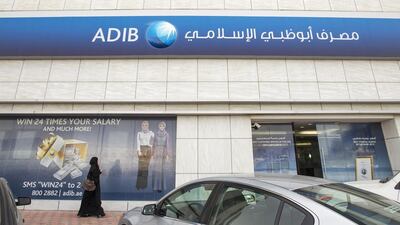Abu Dhabi Islamic Bank is studying the possibility of rebranding its international operations to downplay its Sharia-compliant label and instead leverage growing demand from conventional customers across the Middle East and Asia for what the lender says is a more ethical style of banking.
Tirad Al Mahmoud, the bank's chief executive, said ADIB is also keen at the same time to not alienate its loyal customer base and may use its acronym to call itself Abu Dhabi International Bank abroad while maintaining its original name locally. No decisions have yet been made on the matter, he said.
“Actually if we can, we would like to remove the label Islamic from the name,” Mr Al Mahmoud told reporters yesterday at the bank’s headquarters. “The risk you run if you do that is you alienate the loyal customer base that you have because you have people who have been with you for a while and are loyal and who know you very well and if you remove the word ‘Islamic’ they will say what have you become?
“You’ve become like the rest of them? You are now going to be selling me things that I don’t need? You’re now going to sending me hidden charges. We’re caught between a rock and a hard place.”
ADIB has not been the first Sharia-compliant lender to be faced with this dilemma. Earlier this year Dubai-based Noor Islamic Bank made the move to shorten its name to Noor Bank in a bid to make its appeal more universal. While Mr Al Mahmoud said that it was a easier choice for Noor because it does not have as many local customers as ADIB, he conceded that his bank may eventually have to go down the same road after it commissioned a survey of 1,000 retail customers in the UAE, Egypt, Turkey, and Indonesia that reinforced the suspicion that consumers yearn for more customer focus and honest type of banking.
For years Islamic lenders have faced the challenging task of making Sharia-compliant lending, where interest is banned and banks offer “profit” rates instead, more palatable to the large non-Muslim population that resides in the UAE. And while the share of Islamic banking in the UAE is poised to grow to 50 per cent of the whole market by 2020 from the current 20 per cent, on a global scale the penetration of Islamic lending is statistically negligible at 1 per cent, he said. That leaves a lot of opportunity for Islamic banks successful in their natural constituencies to expand farther afield, offering the same kind of straightforward banking practices.
“We want to define ourselves as an ethical bank,” Mr Al Mahmoud said. “That’s what we want to do and removing the name ‘Islamic’ would make the bank more inclusive. Right now, it’s exclusive. It comes across as a community bank. We are studying it and we may in the future [call it] internationally Abu Dhabi International Bank and domestically Abu Dhabi Islamic Bank.”
Separately, he said the bank was considering expansion in the Asean region although he declined to name specific countries. The lender has previously signalled its desire to enter North African countries such as Morocco, where there is a growing market for Islamic finance.
He also said that ADIB had reached a tentative agreement with the coordinating committee of creditors for Amlak, the mortgage finance company that was brought to its knees during Dubai’s debt crisis. Because of the nature of Islamic finance however, the bank will be able to defer some of the repayments of the principal that was lent to a later date.
“We’re trying to make the company solvent again from an accounting point of view, and to make the company solvent you have to change the way you recover your principle,” Mr Al Mahmoud said. “So you could give the company a temporary waiver on a certain part of the principle that you recapture in the future if the company reaches certain thresholds. And that is uniquely possible in Islamic finance.”
mkassem@thenational.ae
Follow us on Twitter @Ind_Insights

